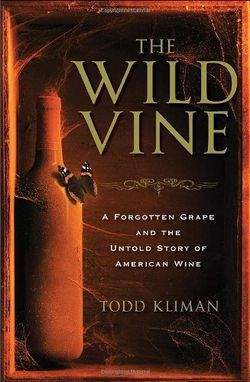By Evan Dawson, Managing Editor
 The Wild Vine is not, at its core, a wine book in the most common sense. It is a story of outsiders, connected over the generations by a common sense of purpose and discovery. And like The Billionaire's Vinegar, it is such a compelling work of narrative nonfiction that I have reccomended it to friends who don't care much for wine.
The Wild Vine is not, at its core, a wine book in the most common sense. It is a story of outsiders, connected over the generations by a common sense of purpose and discovery. And like The Billionaire's Vinegar, it is such a compelling work of narrative nonfiction that I have reccomended it to friends who don't care much for wine.
But if you do care for wine, Todd Kliman's book takes on an added weight. And if you care for American wine, it becomes essential reading; the fact that it's gripping and well paced is merely a bonus.
Kliman tells the story of how the Norton grape came to be the American answer to the great wine grapes of Europe. His exhaustive research takes us back centuries, when settlers strove to create a wine society but failed repeatedly. The history and storytelling is so interesting that there is a sense of drama and relief when Dr. Daniel Norton creates this wonder grape; we know it's coming, but it's exciting nonetheless.
But you might wonder: What's Norton? Even the most ardent wine lovers in this country know little or nothing about Norton. That's apparently a problem of modern marketing, but it's also a result of the unfortunate history of the grape and some of its champions, as Kliman details richly. Shifting from the past to the present, Kliman sketches parallels that are hard to miss.
Unfortunately, Kliman seems determined to make sure we don't miss them, so by the book's end he has hammered us with overt declarations. I found myself wondering why he seemed to lose faith in subtlety as the book progressed. After all, he has written such a lovely story that we couldn't possibly miss the connections he wishes us to see.
Without ruining the plot, I'll simply say that Kliman might have been better served to trust his readers a bit more.
There is also the issue of purple prose, a term used to describe over-writing. Twelve pages in to the Wild Vine, I tweeted, "Todd Kliman can write his face off." He is a better writer now than I will probably ever be. But just because you can write your face off does not mean you should actually try to do so. Kliman has so many wonderful tools in his arsenal, but too often he attempts to use them all instead of carefully choosing the best weapon to employ. The first 76 pages of The Wild Vine, comprising Part One, represent some of the very best narrative nonfiction I've ever read. Part Three was a bit tiring, because Kliman seemed set on using two or three adjectives where one would suffice.
But do not let my criticisms convince you I didn't enjoy The Wild Vine. I am now determined to seek out some Norton from Virginia and Missouri. I want to know what the modern-day supporters of Norton are making. The book is a triumph of research and storytelling, and there are stretches of some truly brilliant writing. Kliman is the food and wine editor and restaurant critic for The Washingtonian, and this is his first book. I expect he'll write more, and we'll all benefit if he does.
